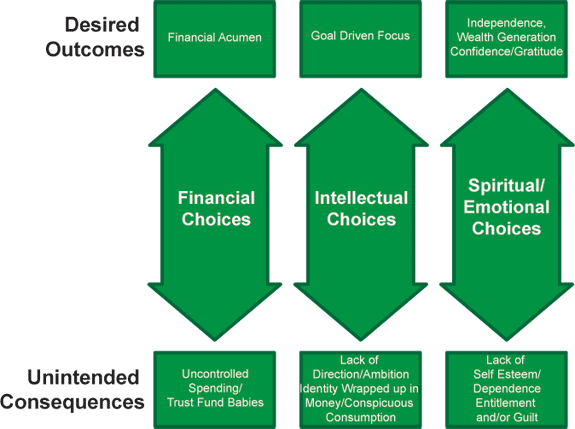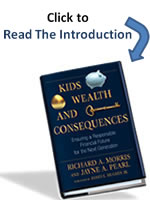Parents, Wealth and Consequences:
Addressing Parents’ Most Pressing Problems
Living in the high net worth environment present parents many challenges in bringing up their children with the proper balance and values surrounding their affluence. This workshop provides a safe, open and comfortable forum for exploring different approaches, strategies and tactics to navigate the often confusing parenting minefield specific to the wealthy.
Jayne and Rich offer three different two- to four-hour workshops or one all-inclusive one- to three-day conference to explore the financial parenting questions wealthy parents have. These workshops explore the Kids, Wealth & Consequences model based on Financial, Intellectual, and Spiritual/Emotional Choices and focus on helping parents avoid the unintended consequences that wealth can impose on their children, including uncontrolled spending, trust fund babies, lack of direction, ambition, and self esteem that often leads to dependence, entitlement, conspicuous consumption and/or guilt about being born into a rich family.
The Kids, Wealth & Consequences model presents choices and tools to help ground and balance children, and impart a strong work ethic, counter their sense of entitlement, prevent them from remaining dependent, help them separate their identity from their wealth, develop confidence in themselves, instill a desire to give back to society, and develop into good stewards of their wealth for future generations.

Workshop 1 -- Financial Choices explores these commonly asked questions:
- What is money for?
- Can I create Intergenerational Equity (replication of my lifestyle) for my kids?
- What is a sustainable spending rate? At what rate should I be spending?
- Trust governance: how do I ensure my trustees will carry out my values and wishes?
- Are conditions for kids receiving assets/cash a good idea and do they work?
- Should I be managing investments and trusts with a 100-year view? If so, how can I do that?
- How do asset allocation, asset location (which trust the asset ends up in), and manager selection work together—especially in the new post-financial meltdown realities?
Workshop 2 -- Intellectual Choices explores these commonly asked questions:
- What are the financial educational needs of my children and how do I make sure they learn what they need to manage wealth responsibly?
- What lessons from the 2008-2009 economic crisis should I impart to my children?
- Should I give my children an allowance, and how can I structure allowance so it will be an effective learning tool, not just fuel more spending?
- Should my kids get after-school and summer jobs?
- What is meaningful work?
- How can I instill purpose and drive in my children?
- Should I allow my kids to fail and learn from their mistakes?
- How can I get my children ready to make group decisions after I am gone?
This workshop helps parents construct their own values-based learning tools:
- Five financial values
- Family foundations
- Real-time investing
- Spontaneous learning time
- Financial boot camps and other learning programs
- Games
Workshop 3 -- Spiritual/Emotional Choices explores these commonly asked questions:
- How do I/should I/do my children define success?
- What are the true sources of sustainable happiness?
- What unintended negative messages might my own attitudes about money, work, spending and investing patterns be communicating?
- Who, when, how and why should I talk to my kids about money and trusts?
- How do my lifestyle choices affect the children?
- How can I prevent my kids from feeling either guilty or entitled about our family wealth?
- Which of my life’s experiences would be good to share about how money has helped and hindered me?
- What can I do to strengthen the glue that holds the family together?
Workshop 4 -- All Inclusive Conferences spend one-to-three days to address all the questions described above. We fully customize each conference to your group’s unique needs.
We are also happy to customize workshops using any combination of the questions, issues and tools described above.

